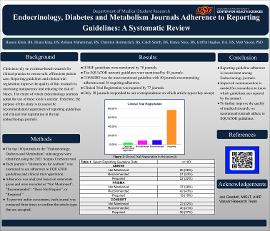| dc.contributor.author | Khan, Hassan | |
| dc.contributor.author | King, Diana | |
| dc.contributor.author | Muhammad, Rohaan | |
| dc.contributor.author | Hemmerich, Christian | |
| dc.contributor.author | Smith, Caleb | |
| dc.contributor.author | Nees, Danya | |
| dc.contributor.author | Hughes, Griffin | |
| dc.contributor.author | Vassar, Matt | |
| dc.date.accessioned | 2023-11-02T20:44:06Z | |
| dc.date.available | 2023-11-02T20:44:06Z | |
| dc.date.issued | 2023-02-17 | |
| dc.identifier | ouhd_Khan_endocrinologydiabetesandmetabolism_2023 | |
| dc.identifier.citation | Khan, H., King, D., Muhammad, R., Hemmerich, C., Smith, C., Nees, D., Hughes, G., and Vassar, M. (2023, February 17). Endocrinology, diabetes and metabolism journals adherence to reporting guidelines: A systematic review. Poster presented at Research Week, Oklahoma State University Center for Health Sciences, Tulsa, Ok. | |
| dc.identifier.uri | https://hdl.handle.net/11244/339872 | |
| dc.description.abstract | Background: Clinicians rely on evidence-based research for clinical practice to ensure safe, efficacious patient care. Reporting guidelines and clinical trial registration improve the quality of this research by increasing transparency and reducing the risk of biases. The extent of which endocrinology journals adopt the use of these tools is unclear. Therefore, the purpose of this study is to assess the recommendation/requirement of reporting guidelines and clinical trial registration in the top endocrinology journals. | |
| dc.description.abstract | Methods: The top 100 journals in the “Endocrinology, Obesity, and Metabolism” subcategory were identified using the 2021 Scopus CiteScore tool. The “Instructions for Authors” of each journal was analyzed for statements regarding select reporting guidelines outlined by the Enhancing the Quality and Transparency of health Research (EQUATOR) Network as well as clinical trial registration. Statements were recorded as “Not Mentioned”, “Recommended”, “Does Not Require”, or “Required.” To prevent unfair assessment, each journal was contacted to confirm the article types that are accepted. | |
| dc.description.abstract | Results: Of 100 journals examined, ARRIVE was the most commonly mentioned guideline with 51 journals recommending adherence and 21 journals requiring adherence. QUOROM was the least frequently mentioned guideline with only three journals recommending its use and two requiring it. CONSORT was recommended by 40 journals and required by 36 journals. Finally, 77 journals required clinical trial registration. | |
| dc.description.abstract | Conclusion: There are inconsistencies in the adoption of reporting guidelines in the top endocrinology journals. We recommend that journal editors in this field should more strongly enforce adherence to validated reporting tools to improve the quality of research that is published. | |
| dc.format | application/pdf | |
| dc.language | en_US | |
| dc.publisher | Oklahoma State University Center for Health Sciences | |
| dc.rights | The author(s) retain the copyright or have the right to deposit the item giving the Oklahoma State University Library a limited, non-exclusive right to share this material in its institutional repository. Contact Digital Resources and Discovery Services at lib-dls@okstate.edu or 405-744-9161 for the permission policy on the use, reproduction or distribution of this material. | |
| dc.title | Endocrinology, diabetes and metabolism journals adherence to reporting guidelines: A systematic review | |
| osu.filename | ouhd_Khan_endocrinologydiabetesandmetabolism_2023.pdf | |
| dc.type.genre | Presentation | |
| dc.type.material | Text | |
| dc.subject.keywords | reporting guidelines | |
| dc.subject.keywords | endocrinology | |
| dc.subject.keywords | EQUATOR | |
